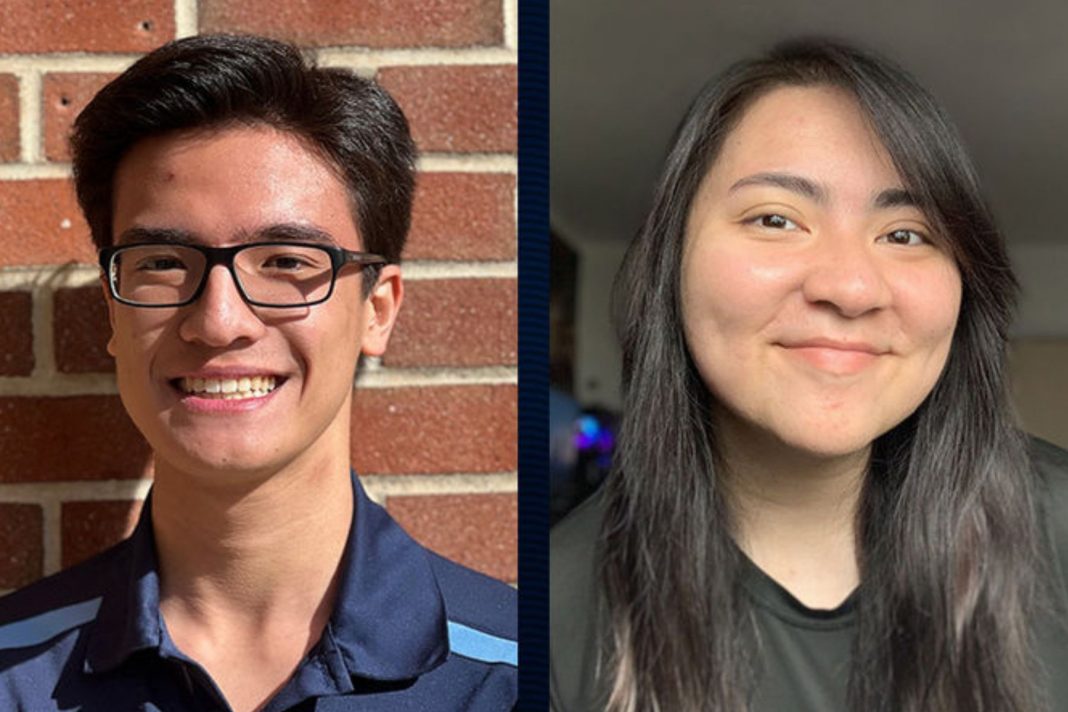Two Penn State Berks students received the 2024 Erickson Discovery Grant. Rising fourth-year student Kimberly Nicholas and rising third-year student Nathan Tam are two of the 43 recipients of the grant University-wide.
The Rodney A. Erickson Discovery Grant program, named after Penn State’s 17th president, provides undergraduate students with the opportunity to participate in research, scholarship and creative work with the help of a research mentor. The grant is funded by Penn State Undergraduate Education.
Nicholas, a communication arts and sciences (CAS) and psychology double major from Taiping, Malaysia, decided to apply after talking with her aunt, Cheryl Nicolas, associate professor of communications arts and sciences at Penn State Berks and supervisor for her research.
Her research, titled “Real Problems in Fake Worlds,” focuses on toxicity in first-person shooter video games and how it plays out in a hyper realistic space. Her inspiration for the research stems from her experiences playing online video games and watching and experiencing sexism from other players.
Additionally, since Gamergate — an online harassment campaign that targeted women in the video game industry — the topic has been discussed but the area of studies within this realm of communication is slowly emerging.
Her process for conducting research has involved three guiding questions for interviewees: What is toxicity and how do people understand it; how do people experience and talk about toxicity, and what are the conditions that need to be present for toxicity to happen in video games?
So far, the most common theme Nicholas has noticed has been derogatory messages or speech towards any player that is perceived to be feminine in any way — through their avatar or voice, for example. Nicholas noted that the pressure for video game players to be masculine is the expectation, regardless of their real-life gender identity.
“As Cheryl and I started transcribing and dissecting the interviews, we found that people started talking about toxicity in normalized ways. We thought that was interesting,” Nicholas said.
Down the road, Nicholas wants to publish her research. Prior to attending Penn State Berks, she said she believed that most research was quantitative and STEM-based. But, through the help of her aunt, her other professors and CAS classes, Nicholas said she learned there’s value in qualitative research.
“It’s been an amazing experience doing research with my aunt. She, along with my other professors at Penn State Berks, namely Dr. Ramsey and Dr. Greenauer, have also been incredible at helping build this research throughout my classes. They have been very instrumental in helping me develop this research trajectory,” Nicholas said.
Tam’s decision to apply for the Erickson Discovery Grant came after talking with friend and one of last year’s recipients, Daniel Abramov.
A biochemistry major with minors in chemistry and math from Reading, Tam’s research, titled “Computational analysis of the decarboxylation mechanism in aromatic compounds: Effects of proximal substituents,” stems from his interest in computational chemistry — a branch of chemistry that uses computer simulation to assist in solving complex chemical problems — and his work with Lorena Tribe, professor of chemistry and Tam’s supervisor for his research.
“I wanted to dive deeper into the realm of physical organic chemistry that can relate to some of the concepts in quantum chemistry, organic chemistry and computational chemistry,” Tam said.
For his research, Tam is studying aromatic compounds and carboxylic acids, both of which are arrangements of molecules found in nature, using artificial intelligence (AI) modeling to run calculations on subsets of these molecules. He’s planning to combine computer science and AI modeling with molecular modeling through the help of a supercomputer, a type of high-level computer used to solve complex computations by breaking down tasks into multiple parts.
Tam shared that this research could be impactful in incorporating artificial intelligence in computational chemistry.
“The field of computational chemistry is progressing in a direction that’s going to be influenced by AI,” he said. “I think, in any computational world, AI is going to start being able to do calculations and make very accurate predictions that don’t require people to sit in front of a computer when these super computers can simulate them in seconds.”
He also noted the practical connection of his research in how it might lend insight into environmental problems by examining the degradation process of molecules.
Along with Tribe, Tam credited the faculty at Penn State Berks with allowing him to grow in and out of the classroom.
“Being in the environment of Penn State Berks and having so much attention from professors has given me the opportunity to explore my intellectual interests beyond course material,” Tam said. “If you’re proactive and engaging, there are limitless resources for you.”
For more information about the Erickson Discovery Grant, visit the Undergraduate Research and Fellowships Mentoring website.


